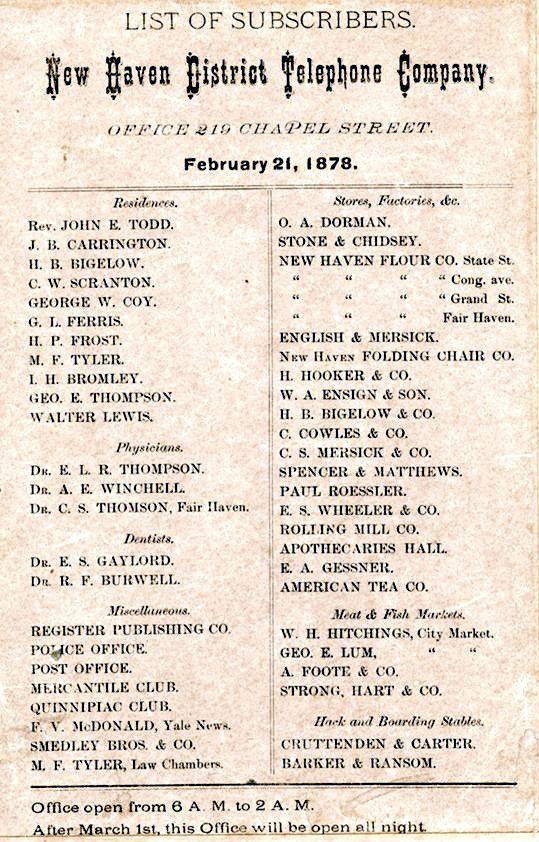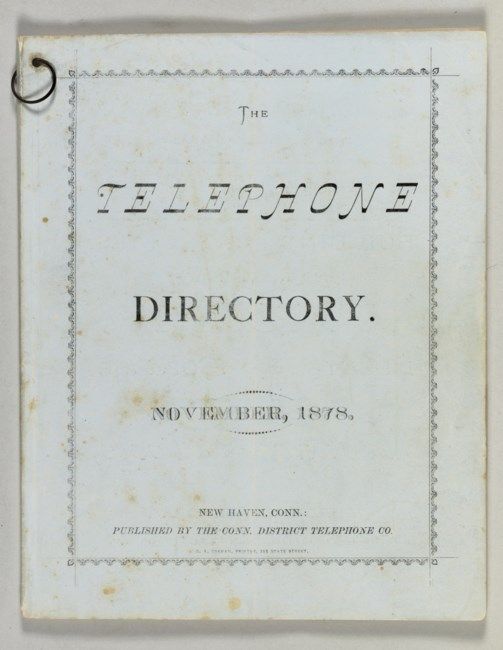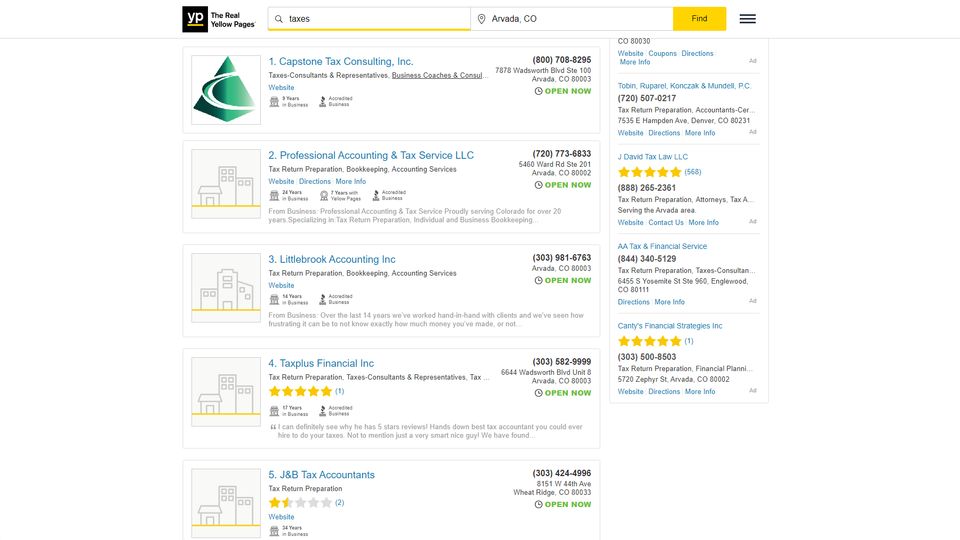
50 Names, One Phonebook
The Unlikely Hero of Local SEO
The first telephone directory listed only 50 names. It was issued on a day like this, 1878, by the New Haven District Telephone Company, and for just $1.50 a month (or about $47 in today’s money), every subscriber could call any of the other subscribers on the list. Back then, phones were still considered an impractical luxury, and phone numbers hadn’t even been invented yet (an operator manually connected calls, so they weren’t necessary).
While humble in the beginning, this was the birth of the phone book, which would become the go-to source for finding contact information, changing the way local businesses attracted customers forever.

To say that communication has dramatically changed since the 1800s would be a gross understatement. The phone book evolved and brought online listings. For the last couple of decades or so, people have come to go online more and more searching for everything from where to cut your hair to niche restaurants. Before the digital age, if you weren’t on the Yellow Pages, you missed out on one of the biggest ways people could find your business. Today, you’re missing out if you’re not using SEO.
Since today is the anniversary of the issuing of the first telephone directory ever, we’re diving into the role listing directories play in your local SEO. We’re also looking at which directories you should be using when listing your business based on your industry. But first, a bit of history.
The Historical Significance of Directories
In February 1878, the 50 New Haven District Telephone Company subscribers became more connected than ever. They were the first ever to have at their disposal the ability to instantly communicate with their local police office, post office, doctors, stores, and more. People quickly saw the value in being able to contact others over the phone, so the number of subscribers of the New Haven District Telephone Company grew eightfold to about 391 in just a few months.

Since telephones were still a novelty in the 1800s, early phonebooks contained instructions on how to correctly use a phone – back then the microphone and the speaker were two separate parts, and people often got them mixed up. As more and more people adopted the telephone, phonebooks grew in size and became the go-to source for finding contact information. By the early 1900s, phonebooks were being published by multiple companies across the United States
Transition to the Digital Age
In the digital age, people don’t go to a store to rent physical copies of movies which will generate late fees if not returned quickly. Payments aren’t necessarily physical anymore. For many, even work offices are a thing of the past. So, it’s no surprise that the use of printed phone books started to lose relevance; it became easier to search for contact information online rather than flipping the pages of a physical book.
Companies such as the Yellow Pages realized the importance of providing their services online.
In the UK, the last copies of the Yellow Pages were posted on January 18th, 2019. The number of people who use physical phone books just keeps decreasing year after year. There’s a new way for businesses to be found.
The Intersection of Online Directories and SEO
SEO, or Search Engine Optimization, is the practice of increasing the quantity and quality of traffic to a website through organic (non-paid) search engine results, by optimizing website content and structure to make it more appealing to search engines. In 2024, it is one of the most cost-effective marketing strategies out there, as it costs nothing to implement, and when done properly, it benefits businesses in the long term.
Search Engines trust consistency. This won’t be news to anyone, but online searches are serviced by algorithms, and an algorithm can’t verify whether a store’s location, phone number, or email address is correct, but it trusts contact information if it sees consistency throughout online directories.
Search Engines realized that more and more people were starting to rely on online directories to find businesses, so algorithms began checking for contact information consistency throughout each listing. So, if Joe’s Pizza moved from 123 to 321 Main St but the business didn’t update their address across all online listing directories, to avoid confusion as to which one of those two addresses was correct, Google and other search engines started to recommend Joe’s pizza less and less to local searchers, and that way people were less likely to end up at a wrong address.
So, before your business gets recommended to local people looking for your services or products, search engines will check that all your contact information is correctly displayed in every directory you appear, including (but not limited to): your website, social media platforms, review platforms such as Yelp, and more.
Benefits of Online Directories for SEO
When businesses are listed on online directories, not only do they improve their SEO, but they also increase their chances of being found by people looking for their services and products. The Rule of 7 says that customers need to see your brand at least 7 times before they commit to a purchase decision, so it helps if your business is correctly listed across as many platforms as possible to help potential consumers reach that wonderful number.
Seeing the same brand appear across many pages on search results generates confidence – especially when people see said brand’s logo appear on all of them.
Here are some important listings your business should have:
- Google Business Profile, a MUST for local SEO, as it allows businesses to appear in local search results and Google Maps, providing key information like location, hours, and services.
- Bing Places for Business, which allows your business to be found by users of Bing, or about 8% of searches in the US.
- Yelp, crucial for businesses in hospitality, services, and retail.
- LinkedIn, for B2B companies.
- Facebook’s vast user base and social signals can boost online presence and engagement.
- Better Business Bureau (BBB)
- Yellow Pages
- Angi (formerly Angie’s List), for service-oriented businesses.
Additionally, there are some Industry-Specific Directories you should consider:
- Booksy: for beauty & wellness professionals such as barbers, makeup, massage, nail salons, and more.
- Clutch.co: A B2B directory that showcases top service providers in fields like IT, marketing, and consulting.
- Trip Advisor: for restaurants and other businesses in the travel, tourism, and hospitality industries.
- Houzz: Focuses on home renovation and design.
- Avvo: For legal services.
- TransportReviews.com: A directory for moving and auto transport companies.
- Zillow: Offers listings for real estate and rental properties.
- Healthgrades: A directory for individuals in the healthcare industry, including doctors, dentists, and other practitioners.
- TheBash.com: An online marketplace for booking bands, entertainers, and DJs for events.
- WalletHub: Allows financial advisors and insurance agents to list their services and connect with potential clients.
- ThomasNet: A directory for finding manufacturers, distributors, and service providers in the manufacturing sector.
- Thumbtack: For providers of different home services such as cleaning, renovation and maintenance.
- Wholesale Central: A B2B directory for wholesale suppliers and products.
- Wellness.com: for healthcare providers.
Best Practices for Utilizing Online Directories
A good practice when using Online Directories, besides consistency, is uploading your business’s logo whenever possible. Businesses with logos certainly are a minority out of those listed in online directories, so by just seeing your logo, people’s eyes will more easily gravitate towards your business than those who only display your competitors' names. Also, brand consistency is one of the factors that help inspire confidence in people.

Also, consider making your business available to be reached by consumers directly on online directories. Don’t worry, that doesn’t mean constantly logging into 100 directories just to see whether you got a message in each one of them; most will just send you an email when people try to reach out to you.
It’s important to remember that not all directories are made equal, so don’t think you need to list your business in just about every single directory out there – there are way too many to realistically be present in all of them, but more importantly, not all of them are equally relevant. Focus on the main ones we all have heard of and those that are particularly relevant in your industry.
The Future of Online Directories and SEO
Technology is ever-changing. More and more people are looking for things with voice searches or through generative AI such as ChatGPT. Machine learning is the way many companies create targeted ads, and they use information generated by tools such as the Meta Pixel. Virtual Reality, despite not being as widely adopted as maybe Facebook’s company Meta would like it to be, is an industry that keeps growing, which naturally calls for ads that incorporate interactive virtual environments. It’s exciting to imagine what the future of marketing could bring!

As for SEO, it’s hard to predict whether things will radically change with the way search engines interact with businesses, but one thing’s for sure: to stay competitive, businesses must spend at least some of their marketing efforts online, which includes online directories.
In Conclusion
The journey from the first telephone book to today's sophisticated online directories has been nothing short of transformative. From a humble list of 50 names to a vast digital landscape encompassing countless businesses, this evolution reflects society's transition into the digital age. Online directories have become integral to SEO, providing a vital platform for businesses to establish visibility and credibility in the online marketplace. Looking ahead, innovation will continue to shape the landscape of online directories, offering new opportunities and challenges for businesses seeking to harness their potential for growth and success. As technology advances and consumer behaviors evolve, businesses must remain adaptable and forward-thinking to leverage the full benefits of online directories in the ever-changing digital ecosystem.

